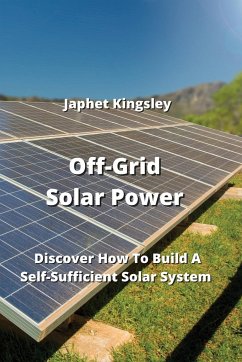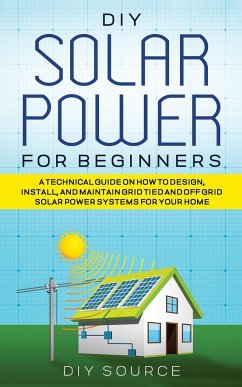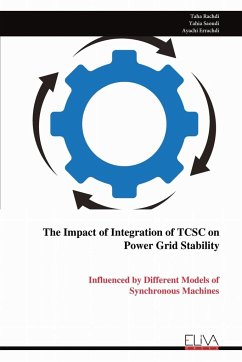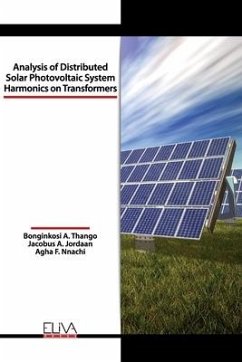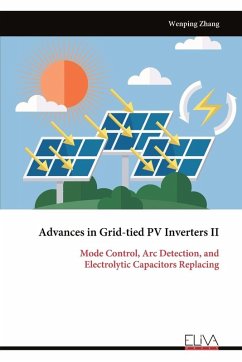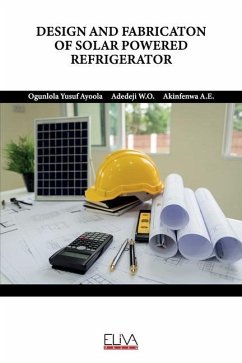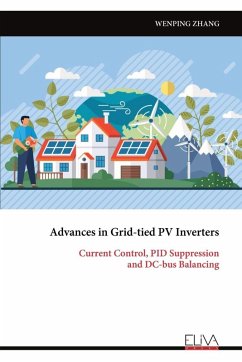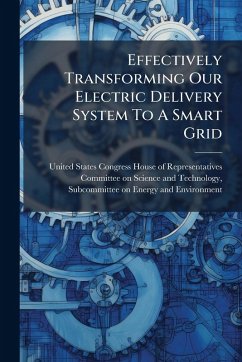
Off Grid Solar Power Handbook
The Ultimate Beginner's Guide
Versandkostenfrei!
Versandfertig in 1-2 Wochen
78,99 €
inkl. MwSt.

PAYBACK Punkte
39 °P sammeln!
Solar power is a remarkable and environmentally friendly source of renewable energy that has gained widespread recognition as a key player in the transition towards a sustainable future. At its core, solar power harnesses the energy emitted by the sun and converts it into electricity through a process known as photovoltaics, offering numerous advantages for individuals, communities, and the planet at large. How Solar Power Works: Solar power relies on the principles of the photovoltaic effect, a phenomenon discovered in the mid-19th century. Here's a simplified explanation of how solar power w...
Solar power is a remarkable and environmentally friendly source of renewable energy that has gained widespread recognition as a key player in the transition towards a sustainable future. At its core, solar power harnesses the energy emitted by the sun and converts it into electricity through a process known as photovoltaics, offering numerous advantages for individuals, communities, and the planet at large. How Solar Power Works: Solar power relies on the principles of the photovoltaic effect, a phenomenon discovered in the mid-19th century. Here's a simplified explanation of how solar power works: Solar Panels: Solar panels, also known as photovoltaic (PV) panels, are composed of numerous solar cells made of semiconductor materials like silicon. When sunlight strikes these cells, it excites electrons, causing them to move and create an electric current. Inverter: The electric current generated by the solar cells is in direct current (DC) form, which is suitable for storing but not for powering most household appliances. An inverter is used to convert the DC electricity into alternating current (AC), the standard form of electricity used in homes and businesses. Utility Grid or Battery Storage (Optional): The electricity generated can either be used directly to power your home or business, or it can be sent back to the utility grid if you have a grid-tied system. Alternatively, you can store excess energy in batteries for later use, making you more self-reliant. Advantages of Solar Power: Clean and Renewable: Solar power is a clean and infinitely renewable energy source, making it an eco-friendly alternative to fossil fuels. It produces no greenhouse gas emissions or air pollutants. Energy Independence: Solar power allows individuals and communities to generate their own electricity, reducing dependence on centralized utility grids and mitigating the impact of power outages. Cost Savings: Over time, solar power can significantly reduce electricity bills, and in many cases, homeowners can recoup their initial investment through energy savings and incentives. Low Maintenance: Solar panels require minimal maintenance, typically only needing occasional cleaning and routine inspections. Job Creation: The solar industry contributes to job growth, fostering employment opportunities in manufacturing, installation, maintenance, and research. Sustainability: Solar power contributes to the global effort to combat climate change and reduce reliance on finite fossil fuel resources. Grid Stability: Distributed solar installations can enhance the stability and resilience of the utility grid by reducing strain during peak demand periods. Conclusion: Solar power is more than just a technology; it represents a brighter, cleaner, and more sustainable future. As advancements in solar technology continue, the efficiency of solar panels increases and costs decrease, making solar power an increasingly accessible and viable energy solution for individuals and communities worldwide. By harnessing the abundant energy of the sun, we take a significant step towards mitigating climate change and creating a more sustainable planet for generations to come.



